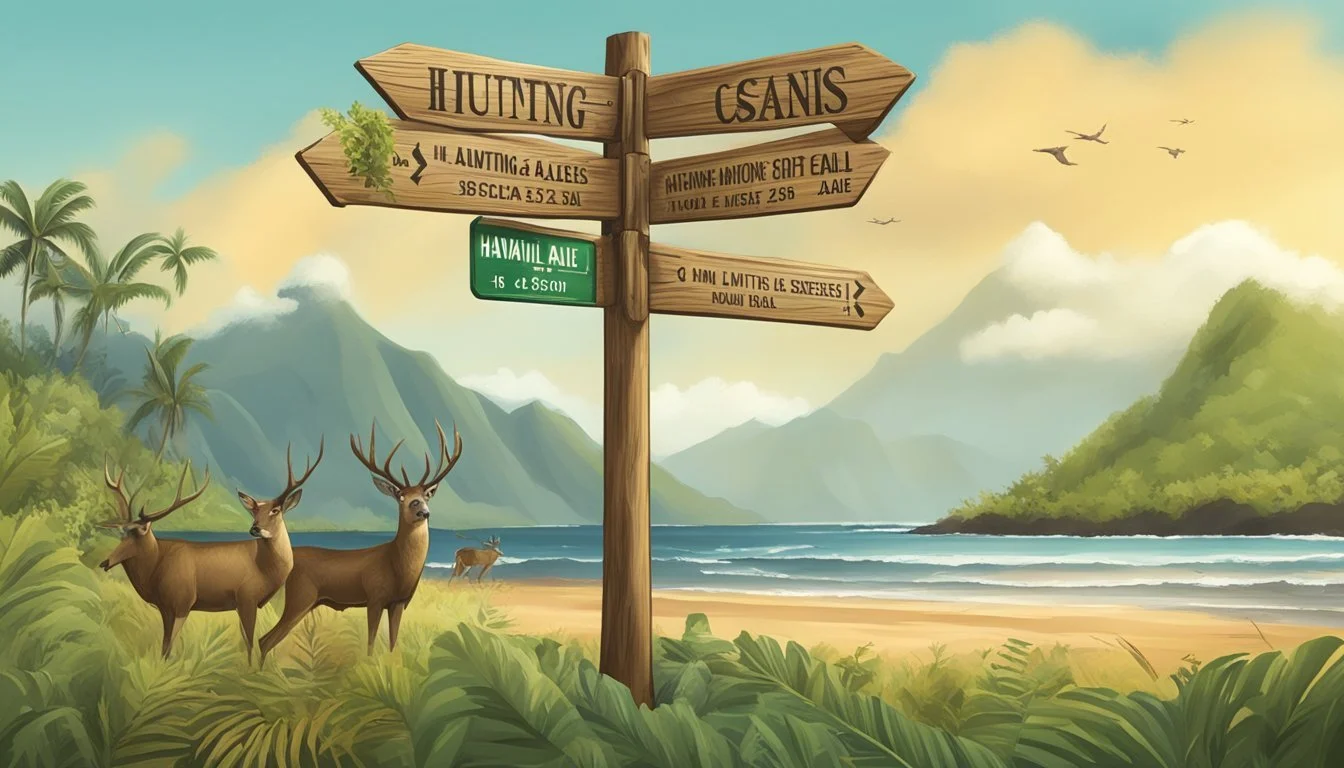Hunting Seasons in Hawaii
Essential Dates and Regulations
This Article is Part of Our Hunting Seasons Guide for All 50 US States
Hawaii offers a unique hunting experience, blending diverse landscapes with a wide array of game species. The Hawaiian Islands provide hunting opportunities across both public and private lands, encompassing a variety of habitats. The state designates specific hunting areas, such as Public Hunting Areas (PHA) and Game Management Areas (GMA), ensuring hunters can engage in the activity with proper regulations in place. Hunting in Hawaii is not just a pastime but also a significant part of wildlife management, contributing to conservation efforts and the balance of ecosystems.
Each island within the state—Kaua'i, O'ahu, Maui, Moloka'i, Lana'i, and the Big Island of Hawai'i—features designated hunting units open during certain times of the year, with season dates and bag limits established to maintain sustainable populations. Hunters can pursue game mammals including deer and pigs, as well as game birds such as turkey and waterfowl. Regulations are in place to inform hunters about season dates, legal hunting methods, and equipment, ensuring both safety and preservation of wildlife.
It is vital for anyone interested in hunting in Hawaii to consult the most current regulations from the Hawaii Department of Land and Natural Resources (DLNR) or the Division of Forestry and Wildlife (DOFAW). These resources provide the necessary information on licenses, permits, bag limits, and specific area restrictions, which could be subject to changes every season. Compliance with these rules is crucial for preserving Hawaii's unique ecosystems, supporting their management, and providing an equitable hunting experience for all.
General Regulations
In Hawaii, hunting is regulated by the Department of Land and Natural Resources, Division of Forestry and Wildlife (DOFAW). Adherence to Hawaii hunting regulations is mandatory, ensuring sustainable wildlife populations and safety.
Hawaii Hunting Licenses
Hawaii requires that all hunters possess a valid hunting license, whether they are residents or non-residents. The application process can be completed online through the DOFAW website or in person. Licenses must be renewed annually.
Resident requirements:
Must provide proof of residency.
Non-resident requirements:
May be subject to different fee structures.
Hunter Education Requirements
Before obtaining a hunting license, individuals must complete a Hunter Education Course. This educational component ensures that hunters are knowledgeable about Hawaii's hunting laws, ethical hunting practices, and firearms safety.
All hunters: regardless of age, need to have a Hunter Education Certificate.
Firearms safety: emphasized to minimize hunting accidents.
Wildlife Conservation Stamp and Permits
In addition to a hunting license, hunters must obtain a Wildlife Conservation Stamp and may require additional special permits depending on the game and season.
Wildlife Conservation Stamp: an annual purchase required for hunting any game bird or mammal.
Special Permits: may be needed for certain hunting areas or for particular species; some bag limits apply under these permits.
Note:
The Wildlife Conservation Stamp is separate from a hunting license.
Hunting areas and bag limits are established by the DOFAW and may be subject to changes through administrative rules.
Game Management
Hunting in Hawaii is managed to balance wildlife conservation with recreational opportunities. This section elaborates on the designation and regulation of hunting units and areas, differentiates between public and private land hunting, and explains the role of the Division of Forestry and Wildlife in game management.
Hunting Units and Areas
Hawaii's hunting areas are categorized into Public Hunting Areas (PHAs) and Game Management Areas (GMAs). The GMAs are specifically designated regions across the islands where various game species can be hunted. These include areas on Kauaʻi, Oʻahu, Molokaʻi, Lānaʻi, Maui, and Hawaiʻi Island. Boundary changes to these areas are reflected in administrative rules, ensuring hunters are aware of the most current information.
Public vs Private Lands
While public hunting areas are available to hunters, some may also pursue game on private lands. However, they must obtain explicit permission from landowners. In contrast, public hunting lands are managed by state agencies and typically have broader access for hunters, which is subject to state regulations and hunting seasons.
Division of Forestry and Wildlife
The Division of Forestry and Wildlife (DOFAW) is responsible for managing game species and their habitats across both GMAs and PHAs. They monitor game populations, implement hunting regulations, and inform the public of any boundary changes in game management areas. DOFAW's management ensures sustainable hunting practices and the stewardship of Hawaii's natural resources.
Seasonal Information
Hawaii offers hunters diverse opportunities across the islands, with specific seasons for hunting various animals such as deer, game birds, and other mammals.
Deer Hunting Seasons
Axis Deer: Hunters can pursue axis deer year-round on private lands with landowner permission. On public lands, the season typically spans from February to May, but dates can vary by island. For example, Kauai Black-tailed Deer has a rifle season that runs on weekends and state holidays throughout the year within specified Hunt Units.
Bird Hunting Seasons
Game Birds: Seasons for hunting game birds like pheasant, quail (What wine goes well with quail?), dove, and partridge usually occur from November to January. Specific to turkeys, the Wild Turkey season often falls between March and April. For the Spotted Dove and other migratory birds, hunters should check current season dates as they can fluctuate annually.
Mammal Hunting Seasons
Game Mammal Hunting: Various mammals, including mouflon sheep, feral hogs, and feral goats, have designated seasons. For instance, Mouflon Sheep may be hunted from August to October, while hunting for Feral Goats is permissible through a lottery drawing during certain months, often in mid-year. Hunt Unit K is open for Feral Goat hunting from July to August. Hunters are advised to consult the latest regulations since these seasons are subject to change based on population management needs.
Hunting Techniques
In Hawaii, hunters apply various techniques depending on the season and game they are pursuing. The islands offer distinct opportunities for archery, firearm, and muzzleloader hunting, each requiring specific skills and equipment.
Archery Hunting
Archery hunting in Hawaii is an appealing challenge for those who prefer a close-range and stealthy approach. Hunters use compound bows, recurve bows, or crossbows to hunt game such as feral goats, sheep, and black-tailed deer. Archers must practice precision and patience, often from elevated positions or hides to remain unseen.
Recommended Equipment:
Compound bow
Recurve bow
Crossbow
Arrows/Bolts
Firearm Hunting
Firearm hunting is the most common technique, allowing for a broader range of engagement distances. Hunters typically use rifles and shotguns depending on the game species and the terrain’s demands. In Hawaii, firearm hunters must adhere to stringent regulations concerning the type of ammunition and firearm used, ensuring safety and conservation.
Firearms for Small Game:
.22 caliber rifles
Shotguns with birdshot
Firearms for Big Game:
High-powered rifles with non-lead ammunition
Muzzleloader Hunting
Muzzleloader hunting harkens back to traditional hunting methods and is marked by the use of black powder rifles. This form of hunting demands a high level of skill, as hunters get only a single shot before needing to reload. Muzzleloader season often provides an opportunity for hunters to take to the field at times when other hunting methods are not permitted.
Key Points:
Muzzleloaders are loaded from the firearm's muzzle.
Hunters typically use round balls or conical bullets.
Bag Limits and Special Rules
In Hawaii, hunters must adhere to specific bag limits and rules designed to manage wildlife populations sustainably and ensure safety. These regulations are subject to change, so verification with the latest state guidelines is vital.
Species-Specific Regulations
For certain game mammals, Hawaii determines bag limits to control wildlife populations and maintain ecological balance. For instance:
Deer: Bag limits vary by island and hunting season. Hunters should check the latest departmental publications for specific limits.
Turkey: There are often specific periods during the year when turkey hunting is allowed, with designated bag limits.
The state also enforces rules about weapon types, with general rifles being a common choice for many large game species. Regulations specify what calibers and firearm types can be used, to ensure humane hunting practices.
Youth and Special Hunts
Hawaii encourages young hunters through youth hunts, which are specially designated times that allow for mentorship and training of younger generations in the tradition of hunting. These hunts often have:
Lower age limits for participation.
Specific dates outside of the regular hunting season.
Potentially different bag limits to standard hunts.
Special hunts may also be organized for population control or environmental balance, often with their own set of rules and limitations. Hunters are expected to understand and follow these special guidelines when participating.
Island-Specific Regulations
Hawaii's diverse hunting regulations are tailored to each island, considering the local ecosystems and game populations. Visitors and residents need to follow pertinent guidelines to ensure a lawful and sustainable hunting experience.
Lanai Hunting Information
In Lanai, hunters can find opportunities to hunt Black Tail Deer. The island permits hunting methods to be limited by specific regions or units, therefore it is critical to check the current regulations before planning a hunting trip.
Maui Hunting Information
On Maui, the hunting of wild sheep is a regulated activity, with specific areas designated for hunting at certain times of the year. Detailed maps and seasonal information are provided by the Division of Forestry and Wildlife.
Kauai Hunting Information
The Island of Kauai offers hunting seasons for various game. Each area may have distinct regulations, which are essential for hunters to follow for conservation and safety purposes.
Molokai Hunting Information
Molokai's hunting regulations often specify dates and allowable hunting methods for certain units or regions on the island. This ensures hunter compliance with legal standards and resource management.
Oahu Hunting Information
On Oahu, public hunting areas are maintained with rules focusing on hunter safety and environmental considerations. These regulations are designed to provide a balance between outdoor recreational opportunities and the conservation of natural resources.






